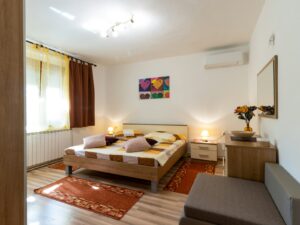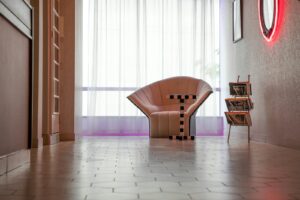The sound absorption properties of vinyl, carpet, hardwood, and laminate flooring differ significantly. Generally, carpet has the highest sound absorption capability, followed by vinyl, hardwood, and laminate. Carpet’s fibers absorb sound waves effectively, reducing noise transmission.
Vinyl also offers decent sound absorption due to its flexibility and thickness. Hardwood and laminate flooring, being solid surfaces, transmit more sound compared to carpet and vinyl.
However, area rugs or underlayment can be added to improve sound absorption for hardwood and laminate floors.
Flooring choices significantly impact the acoustics of a space, with certain materials excelling in sound absorption capabilities.
Sound Absorption Properties of Carpet Flooring
Carpet flooring stands out for its exceptional ability to absorb sound waves, making it a preferred choice for noise reduction in residential and commercial spaces alike.
The dense fibers of carpeting effectively trap and dampen sound, preventing it from bouncing off hard surfaces.
The thickness and construction of carpet fibers influence its sound absorption capabilities. Wool carpets, for instance, exhibit superior sound absorption compared to synthetic fibers.
One of the key benefits of carpet flooring lies in its ability to reduce impact noise, such as footsteps and dropped objects.
In spaces where noise control is paramount, such as bedrooms, offices, and entertainment areas, carpeting proves to be an effective solution.
Sound Absorption Properties of Vinyl Flooring
Vinyl flooring, known for its durability and versatility, also offers commendable sound absorption properties.
While not as effective as carpet in sound reduction, vinyl’s flexibility and thickness contribute to its ability to dampen noise.
Vinyl planks or tiles with thicker underlayment layers provide better sound absorption compared to thinner varieties.
Vinyl flooring is particularly popular in areas prone to moisture, such as kitchens and bathrooms, where traditional carpeting may not be suitable.
Its ease of maintenance and wide range of designs make it a practical choice for spaces where sound reduction is desired without compromising on style.
Sound Absorption Properties of Hardwood Flooring
Solid hardwood flooring is revered for its timeless beauty and durability, yet its sound absorption properties differ from softer flooring options like carpet. Unlike carpet fibers that absorb sound, hardwood floors transmit sound more readily due to their solid surface. However, area rugs strategically placed over hardwood floors can mitigate sound transmission by absorbing and diffusing sound waves.
While hardwood flooring may not offer the same level of sound absorption as carpet, its aesthetic appeal and longevity make it a popular choice for living rooms, dining areas, and entryways. With proper placement of rugs and underlayment, hardwood floors can still contribute to a quieter environment.
Sound Absorption Properties of Laminate Flooring
Laminate flooring, engineered to mimic the look of hardwood while offering greater durability and affordability, presents a unique set of sound absorption properties.
Like hardwood, laminate flooring consists of solid surfaces that transmit sound, albeit to a lesser extent. However, the addition of underlayment can enhance its sound absorption capabilities, making it a viable option for noise-sensitive areas.
Laminate flooring’s resistance to moisture and wear makes it suitable for high-traffic areas such as hallways and family rooms. While not as effective as carpet or even vinyl in sound reduction, laminate flooring offers a balance of style, durability, and moderate sound absorption.
Comparative Analysis
In comparing the sound absorption properties of vinyl, carpet, hardwood, and laminate flooring, it’s evident that each material has its strengths and limitations. Carpet stands out as the superior choice for sound absorption, particularly in spaces where noise reduction is paramount. Vinyl and laminate flooring offer viable alternatives, especially in areas where moisture resistance and durability are priorities. Hardwood flooring, while elegant and timeless, may require supplementary measures such as area rugs to achieve optimal sound absorption.
Read More
Sound Matters: Investigating Noise Levels in Luxury Vinyl Flooring
Soundproofing Secrets: Unraveling the Power of Rubber Flooring




